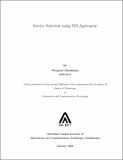Please use this identifier to cite or link to this item:
http://drsr.daiict.ac.in//handle/123456789/181| Title: | Service selection using WS-agreement |
| Authors: | Chaudhary, Sanjay Chudasma, Nrupen |
| Keywords: | Service-level agreements Customer services Performance Measurement |
| Issue Date: | 2008 |
| Publisher: | Dhirubhai Ambani Institute of Information and Communication Technology |
| Citation: | Chudasma, Nrupen (2008). Service selection using WS-agreement. Dhirubhai Ambani Institute of Information and Communication Technology, ix, 54 p. (Acc.No: T00144) |
| Abstract: | The business requirements are dynamic in nature and identification of suitable busi- ness partners "on demand", who can satisfy a set of guarantees is a critical process. Selection of business partners is influenced by several parameters including maximizing profit, minimizing cost, reliability, credit history, etc. A business process can be decomposed into several tasks, possibly expressed as Web services implementing desired business functionalities. Each service offers a set of guarantees, each defining a Service Level Objective(SLO). Many service providers may provide the similar business functionality in the form of service with different SLOs. Thus it is necessary to select the service offered by service partner such that overall performance of the process is improved. The thesis proposes architecture for solving selection of the best service provided by available service partners. To put across our approach, the thesis has taken examples from the Agro-Produce marketing System. By specifying requirements of the service in the form of multiple service level objectives (SLOs), selection of a service provider can be achieved based on the best or optimal matching of SLOs of service consumer and providers. A set of services, SLOs, and participating actors constitute a Service Level Agreement (SLA). In this work, WS-Agreement specification is used to specify the SLA. For flexible selection, role of semantic web concepts such as ontology and semantic rule language is discussed. The service partner must comply with the multiple criteria and preferences of a requester, Multi Criteria Decision Making (MCDM) methods is required in the service selection process. Two scenarios for service selection from Agro-Produce market system are taken. One is single service selection where selection of sellers selling mangos are selected based on the best seller offered. Second one is related to service composition where more than two services need to be selected, such that overall process performance is improved. The scenario is from rice production process where selection of farmer, rice-miller, storage provider and transporter contribute to overall cost, quantity and quality of rice. |
| URI: | http://drsr.daiict.ac.in/handle/123456789/181 |
| Appears in Collections: | M Tech Dissertations |
Files in This Item:
| File | Description | Size | Format | |
|---|---|---|---|---|
| 200511011.pdf Restricted Access | 2.67 MB | Adobe PDF |  View/Open Request a copy |
Items in DSpace are protected by copyright, with all rights reserved, unless otherwise indicated.
